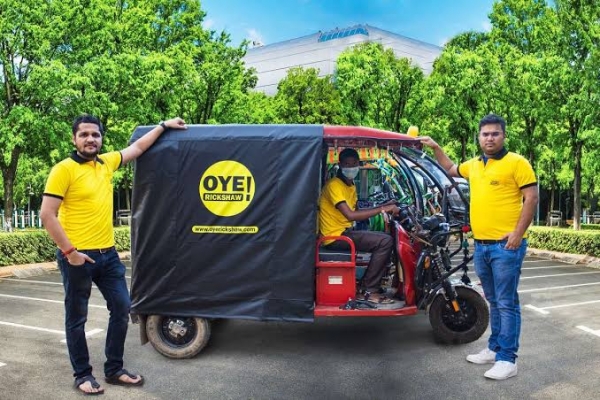Oye! Rickshaw looks to invest $500 million over the next three years
“Speaking of the next three years, we are going to invest roughly 400 to 500 million (US dollars). That’s a lot of money, it sounds, but that kind of invest
- by Gaurav Grover 2021-07-05 09:12:16
Electric Mobility start-up Oye! Rickshaw plans to invest up to $500 million (more than Rs 3,700 crore) in the next three years to build a battery-sharing infrastructure for electric tricycles across India, according to a senior company official.
The company, backed by investors such as Matrix Partners, Chiratae Ventures, Xiaomi and industrialist Pawan Munjal, will invest $20-30 million between this year and next to accelerate its battery exchange business.
A goal has been set to deploy 10,000 lithium-ion batteries by the end of this year, but plans have been affected by the second wave of the Covid-19 pandemic and it is now considering deploying 6,500 lithium-ion batteries in 5,000 vehicles.
Oye! Rickshaw is also focused on expanding its delivery business, which grew several times during the second wave of Covid-19 to offset the impact of the pandemic on its travel business.
“Speaking of the next three years, we are going to invest roughly 400 to 500 million (US dollars). That’s a lot of money, it sounds, but that kind of investment will come… and speaking of it in the short term, it means we in this year or maybe next, we'll invest about $20-30 million.
He added that the investments will go towards setting up a battery exchange infrastructure across India.
Currently, the company has a presence focused primarily on Delhi-NCR and parts of Haryana with more than 5,000 driving partners in the joint electric micro-mobility market for e-rickshaw.

Noting that the battery exchange business is relatively new to the company, Sharma said that currently around 250 to 300 battery exchange transacting partners have joined.
He said, "By December 2021, most of our fleet will be in exchange...Our plan is to double our supply in the next five to six months...So this equates to about 6,500 batteries to be purchased.". additional.
When asked about investment financing, Sharma said, “At the moment, we are sufficiently capitalized… Also, the economy is doing well for us. So we are not in this liquidity-burning game. We are very efficient in that sense but at the same time, It's growing at 30 percent per month. I think the growth rate is good as the economy improves and in the next round, we're not looking for money right away."
Last year, the company raised $12 million.
Commenting on the impact of the pandemic, Sharma said that when the first wave hit, the company had a "complete recalibration of the strategy of how we wanted to go forward. So, we loaded up the delivery and changed the battery" to help it out. The business has set a goal of deploying 10,000 lithium-ion batteries and expanding the delivery business to 10 more cities.
The company is “fully on track 100% as of early April 2021,” he said, adding that while delivery business doubled during the second wave, travel business was affected by about 80% because people didn’t travel, while the battery change was largely “done.” or with a slight effect.
“Net, net, unlike last year, when we hit 100% this year, the impact is contained by 30-40%,” Sharma said, adding that the company’s goal now is to return to the original plans for September 2021.
Sharma said he is optimistic about the market for his business, that the potential is huge with millions of users and will grow even more with the advent of Covid vaccines and people who are responding well.
Oye! Rickshaw claims to have over 13 lakhs of registered users with 91 lakhs of travel and 51 lakhs delivered.
Also Read: After Didi, China launches cybersecurity probe into more US-listed firms
POPULAR POSTS
Best Silver Investment Platforms for 2025: From CFDs to Digital Vaults Explained
by Shan, 2025-10-23 12:22:46
Best Investment Plans in India for 2025: A Complete Guide to Grow and Protect Your Wealth
by Shan, 2025-09-18 10:20:46
Which venture capital firms are the most active in funding Indian startups in 2025
by Shan, 2025-08-06 10:42:11
Top 5 Apps to Buy Digital Gold in India (2025): Safe, Simple & Secure
by Shan, 2025-08-01 10:24:51
10 Highest Dividend Yield Stocks in August 2025
by Shan, 2025-07-28 09:31:02
Exchange-Traded Fund (ETF): A Practical Guide to Smart Investing
by Anmol Chitransh, 2025-04-17 10:18:20
The Ultimate Guide to Commodity Trading: Strategies, Risks, and Opportunities
by Anmol Chitransh, 2025-04-02 07:06:01
RECENTLY PUBLISHED

Loan EMIs to Drop as RBI Slashes Repo Rate - Full MPC December 2025 Highlights
- by Shan, 2025-12-05 11:49:44

The Agentic Revolution: Why Salesforce Is Betting Its Future on AI Agents
- by Shan, 2025-11-05 10:29:23

Pine Labs IPO 2025: Listing Date, Grey Market Premium, and Expert Outlook
- by Shan, 2025-11-05 09:57:07

Top 10 Insurance Companies in India 2026: Life, Health, and General Insurance Leaders Explained
- by Shan, 2025-10-30 10:06:42

OpenAI Offers ChatGPT Go Free in India: What’s Behind This Big AI Giveaway?
- by Shan, 2025-10-28 12:19:11





 Subscribe now
Subscribe now 